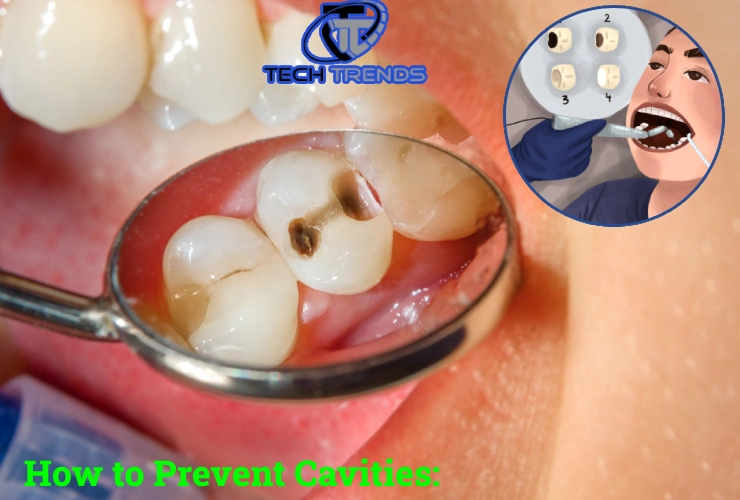Cavities, also known as dental caries, are a common dental issue that can lead to pain, infection, and even tooth loss if left untreated. However, How to Prevent Cavities: is a question that can be answered with the right oral hygiene practices, diet, and lifestyle changes. This comprehensive guide will provide you with natural remedies, dietary recommendations, and daily habits to maintain strong, cavity-free teeth.
How to Prevent Cavities with Natural Remedies
Natural remedies can be a powerful addition to your oral care routine. These methods focus on reducing harmful bacteria and strengthening enamel:
- Oil Pulling: Swish coconut or sesame oil in your mouth for 15–20 minutes daily. This ancient Ayurvedic practice helps reduce plaque and bacteria that cause cavities.
- Clove Oil: Known for its antimicrobial properties, clove oil can be applied directly to teeth to alleviate pain and fight bacteria.
- Aloe Vera Gel: Use aloe vera gel as a natural mouthwash to combat cavity-causing bacteria and soothe inflamed gums.
- Turmeric Paste: Mix turmeric powder with water to create a paste. Apply it to your teeth for its anti-inflammatory and antibacterial benefits.
- Neem Bark: Chew on neem sticks or use neem-based toothpaste to reduce bacteria in the mouth naturally.
- Green Tea: Drinking green tea provides antioxidants and natural fluoride that help strengthen enamel and reduce plaque.
Best Foods for Healthy and Cavity-Free Teeth
Your diet plays a crucial role in maintaining oral health. Certain foods can strengthen enamel and fight cavity-causing bacteria:
- Dairy Products: Milk, cheese, and yogurt are rich in calcium and phosphates that remineralize teeth. Cheese also stimulates saliva production, which washes away food particles.
- Leafy Greens: Spinach, kale, and broccoli are high in calcium and folic acid, essential for gum health.
- Crunchy Fruits and Vegetables: Apples, carrots, and celery act as natural toothbrushes by scrubbing your teeth while stimulating saliva production.
- Nuts and Seeds: Almonds, walnuts, and sesame seeds provide minerals like calcium that strengthen enamel.
- Fatty Fish: Salmon and mackerel are rich in vitamin D, which helps the body absorb calcium effectively.
- Xylitol Gum: Chewing sugar-free gum with xylitol reduces harmful bacteria in the mouth while promoting saliva flow.
Daily Oral Care Habits to Avoid Cavities
Good oral hygiene is the cornerstone of cavity prevention. Here’s what you should do daily:
- Brush Twice a Day: Use fluoride toothpaste and brush for at least two minutes using gentle circular motions to clean all surfaces of your teeth.
- Floss Daily: Flossing removes food particles from areas your toothbrush cannot reach, preventing plaque buildup between teeth.
- Rinse with Mouthwash: Use an antibacterial or fluoride mouthwash to kill bacteria and strengthen enamel.
- Replace Your Toothbrush Regularly: Change your toothbrush every three months or sooner if the bristles become frayed.
The Role of Fluoride in Protecting Teeth
Fluoride is a naturally occurring mineral that plays a vital role in preventing cavities by strengthening enamel and reversing early decay:
- Fluoride Toothpaste: Brushing with fluoride toothpaste twice a day helps remineralize weakened enamel.
- Mouthwash: Rinsing with fluoride mouthwash provides additional protection against decay.
- Professional Treatments: Dentists may apply fluoride varnish or prescribe stronger fluoride toothpaste for high-risk patients.
Home Remedies for Stronger and Healthier Teeth
In addition to natural remedies, these home-based practices can enhance your oral health:
- Saltwater Rinse: Gargle with warm saltwater to balance oral pH levels and reduce inflammation caused by bacteria.
- Baking Soda Paste: Mix baking soda with water to create a paste that neutralizes acids in the mouth (use sparingly).
- Hydrogen Peroxide Rinse: Dilute hydrogen peroxide with water (1:1) to kill bacteria and whiten teeth naturally (use occasionally).
- Vitamin D Supplements: Ensure adequate vitamin D intake through sunlight exposure or supplements to improve calcium absorption.
Read more about : Fitness And Health:
How Sugar Affects Your Dental Health
Sugar is one of the leading causes of cavities as it feeds harmful bacteria in the mouth that produce acid, eroding enamel over time:
- Acid Production: Bacteria convert sugar into acid that weakens tooth enamel, leading to decay.
- Limit Sugary Snacks: Avoid frequent consumption of sugary foods and drinks between meals.
- Rinse After Eating Sugar: If you consume sugary items, rinse your mouth with water or chew sugar-free gum immediately afterward.
Importance of Regular Dental Checkups
Routine dental visits are essential for maintaining oral health:
- Early Detection of Cavities: Dentists can identify cavities before they worsen.
- Professional Cleanings: Dental cleanings remove tartar buildup that cannot be eliminated by brushing alone.
- Sealants for Protection: Dentists may apply sealants on molars to protect them from decay.
Best Toothpaste and Mouthwash for Cavity Prevention
Choosing the right products can make a significant difference in cavity prevention:
- Look for toothpaste containing fluoride as it strengthens enamel.
- Opt for mouthwashes with antibacterial properties like chlorhexidine or essential oils.
- Consider products containing xylitol or hydroxyapatite for added benefits.
Myths and Facts About Cavities and Tooth Decay
Let’s debunk some common myths about cavities:
- Myth: Only children get cavities. Fact: Adults are equally susceptible due to factors like gum recession or dry mouth.
- Myth: Brushing harder cleans better. Fact: Aggressive brushing can damage enamel; use gentle motions instead.
- Myth: Sugar-free drinks are safe for teeth. Fact: Many sugar-free drinks contain acids that erode enamel.
Simple Lifestyle Changes to Keep Your Teeth Healthy
Adopting these lifestyle changes can significantly improve your oral health:
- Drink plenty of water throughout the day to wash away food particles.
- Avoid smoking or chewing tobacco as they increase the risk of gum disease.
- Limit acidic foods like citrus fruits and soda that weaken enamel.
- Manage stress levels since stress can lead to habits like teeth grinding.
Insights on Cavity Prevention
Understanding Your Cavity Risk Level
Knowing your cavity risk level allows you to tailor your oral care routine effectively:
- Low Risk – Maintain regular brushing/flossing; visit the dentist every six months.
- Moderate Risk – Add fluoride rinses; reduce sugar intake.
- High Risk – Use prescription-strength fluoride toothpaste; visit the dentist more frequently.
The Science Behind Cavity Formation
Cavities form when bacteria like Streptococcus mutans produce acids from sugar consumption, eroding tooth enamel over time.
The Role of Saliva
Saliva plays a crucial role in neutralizing acids in the mouth while providing essential minerals like calcium and phosphate needed for enamel repair.
Conclusion:
Taking care of your teeth is essential for a healthy smile and overall well-being. By following proper oral hygiene habits, eating tooth-friendly foods, and avoiding excess sugar, you can effectively reduce the risk of cavities. Simple changes like brushing twice daily, flossing regularly, and using fluoride can make a big difference in your dental health.
Preventing cavities is easier than treating them. Regular dental checkups, natural remedies, and a consistent oral care routine will help you maintain strong teeth. By adopting these habits, you can enjoy a cavity-free smile and long-lasting oral health.


Comments are closed.